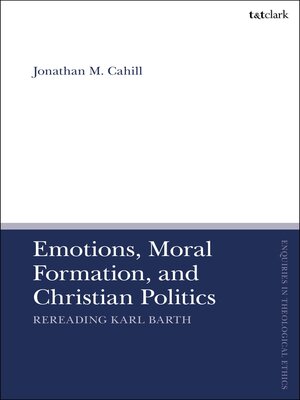Emotions, Moral Formation, and Christian Politics
ebook ∣ Rereading Karl Barth · T&T Clark Enquiries in Theological Ethics
By Jonathan M. Cahill

Sign up to save your library
With an OverDrive account, you can save your favorite libraries for at-a-glance information about availability. Find out more about OverDrive accounts.
Find this title in Libby, the library reading app by OverDrive.



Search for a digital library with this title
Title found at these libraries:
| Library Name | Distance |
|---|---|
| Loading... |
This volume addresses the social-relational nature of moral formation, emotions, and moral agency. Drawing on Barth's theological anthropology and his relational conception of the self, Cahill argues that Barth envisions moral progress as rooted in the growth of the community. Cahill also explores Barth's view of emotion in conversation with the study of emotions in psychology, sociology, neuroscience, and philosophy.
Building on Barth and these other disciplines Cahill argues for a relational and cognitive conception of emotions while highlighting emotions' critical role in regulating group and social relations. Emotions are fundamental to interpersonal interactions, to group relations, and for the reinforcement and disruption of social structures. This account of moral formation and emotion is illustrated through the example of climate change. A community shaped by love for God, solidarity with other creatures, and a concern for all of creation leads to an awareness of hegemonic forces and fosters emotions shaped by the kingdom of God that enables the struggle for climate justice.
Building on Barth and these other disciplines Cahill argues for a relational and cognitive conception of emotions while highlighting emotions' critical role in regulating group and social relations. Emotions are fundamental to interpersonal interactions, to group relations, and for the reinforcement and disruption of social structures. This account of moral formation and emotion is illustrated through the example of climate change. A community shaped by love for God, solidarity with other creatures, and a concern for all of creation leads to an awareness of hegemonic forces and fosters emotions shaped by the kingdom of God that enables the struggle for climate justice.







